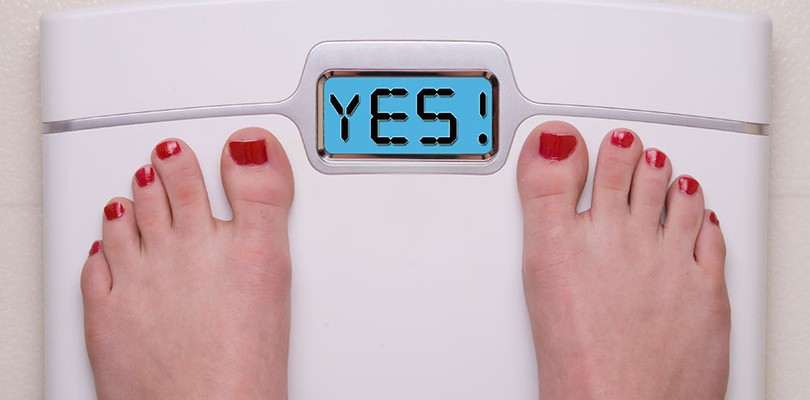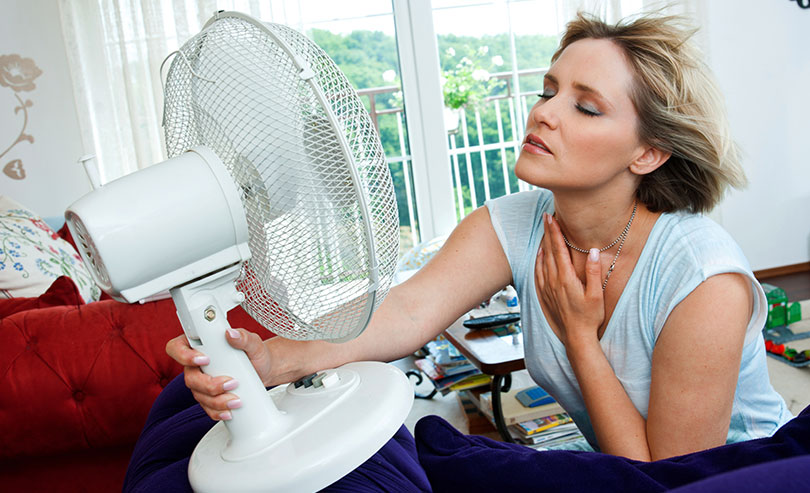
Photo Credit: OlgaMiltsova / istockphoto.com
Menopause and Weight Gain
Despite what you have probably heard about menopause and weight gain, it is NOT inevitable that your waistline will expand as your body goes into the hormonal chaos that is the perimenopause and menopause.
It is true that women entering the menopausal years are statistically more likely to change shape and gain weight, but I’m afraid you cannot use your hormones as an excuse to give up maintaining or aiming for a healthy weight. If anything we – sadly – have to try harder as our metabolism slows down.
You might well be feeling quite indignant that you are having trouble zipping up your jeans even though your diet and exercise plan haven’t changed. So, here are some top tips to help you avoid weight gain, and maybe even manage to improve your BMI and general health along the way!
1. Check Your Portion Sizes
This is the simplest way to keep your weight in check without calorie counting or following a complicated diet. The easiest way to manage portion sizes is to simply serve your food on a small plate.
If you avoid piling it high, a nicely covered small plate will help convince you that you have had a generous meal. Otherwise you might be tempted to fill the gaps on a large plate with food you don’t really need. Breakfast plates are the ideal size.

Photo Credit: lolostock / istockphoto.com
2. Stop Eating When You're Full
I know I sound like I am stating the obvious here but we are conditioned to clean up our plates – no leftovers allowed, waste not want not, etc. But how many times have you found yourself thinking that you are eating something for the sake of it, not because you are enjoying it? It’s OK to leave food behind until you grow used to new portion sizes, and then there will be less waste.

Photo Credit: saje / istockphoto.com
3. Know Your Target Weight
Use a body mass index (BMI) calculator (there are lots online or you could ask your healthcare provider for a paper graph) that takes into account your age, height and gender. If you discover you are over your ideal BMI, then set yourself small achievable weekly weight loss targets.

Photo Credit: Creativestock / istockphoto.com
4. Eat a Healthy, Balanced Diet
I know this sounds terribly dull, but at this stage of life it is especially important to make sure your meals are nutritious. There is no special menopause diet, but it’s wise to make sure you are getting enough calcium to help maintain good bone density. Choose lower fat yoghurts and cheeses and skim milk. Overall, eat a good, balanced diet including plenty of fruit and vegetables to help keep your heart healthy.
Make sure you eat regularly and are not skipping meals as this will help minimize some menopause symptoms like tiredness.
Menopausal arthritis can cause a lot of pain for women. Here are some methods to help lessen the intensity of arthritic symptoms.

Photo Credit: michaeljung / istockphoto.com
5. Get More Exercise
Unfortunately, because of metabolic changes during the run up to and after menopause you might find that even though you have been consistently active extra weight is creeping on.
It’s time to add in more exercise – maybe walk the dog twice a day instead of once, or take up dancing with a friend. They say use it or lose it and finding a hobby that keeps you fit and healthy might help keep you active and supple long into your autumn years.

Photo Credit: Yulia-Images / istockphoto.com
6. Find a New Treat
You might find that being a slave to your hormones leads you to comfort eat chocolate and cake, or to make that occasional glass of wine more regular.
If you find the weight piling on and you know it’s down to too many treats, replace some of your foodie favourites with some calorie-free indulgences. You could treat yourself to a face mask or a good book, or even painting your nails – a favourite of mine that has the added benefit of wet polish making it almost impossible to eat without smudging!

Photo Credit: monkeybusinessimages / istockphoto.com
7. Involve the Family
This could be the ideal opportunity to make your whole household healthier. It’s much easier to eat more healthily and stay fit if everyone is on board with the plan. Just a few small changes could make your usual family meals healthier. Then after dinner instead of slumping in front of the TV have a post-prandial walk.
Suggest family swimming trips, hikes, or if you are feeling competitive you could all work together training for a fun-run or charity walk.
If you have teens who usually spend most of their time in their bedrooms or engrossed in one gadget or another, it will help you spend quality time with them and hopefully even give you chance to chat.
Family unwilling or unavailable? Find a friend!

Photo Credit: monkeybusinessimages / istockphoto.com
8. Don't Bury Your Head in the Sand
You might have struggled for years with your weight or feel it’s too late to tackle it, but with the risk of stroke, heart disease and other health issues increasing the older you get, it makes sense to try hard to be as fit and healthy as possible.
Don’t be afraid to ask for help – your doctor or a local slimming group should be able to advise you on the best food and exercise plan for you and support you on your journey to a healthy weight during menopause.
Read more about overcoming menopause weight loss barriers over at NewLifeOutlook.
While antidepressants treat depression, they can also be used to treat menopause. Here are the pros and cons of using antidepressants for menopause.








